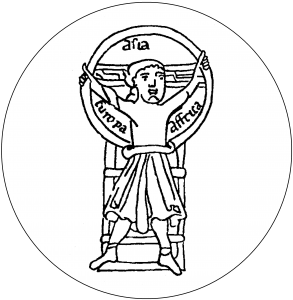The annual symposium of the International Medieval Society Paris will take place from June 29 to July 1, 2017, on the theme of “Evil” in the Middle Ages.
For its 14th Annual Symposium, the International Medieval Society invites abstracts on the theme of Evil in the Middle Ages. The concept of evil, and the tensions it reveals about the relationship between internal and external identities, fits well into recent trends in scholarship that have focused attention on medieval bodies, boundaries, and otherness. Medieval bodies frequently blur the distinctions between moral and non-moral evil. External, monstrous appearances are often seen as testament to internal dispositions, and illnesses might be seen as a reflection of a person’s evil nature. More generally, evil may stand in for an entire, contrasting ideological viewpoint, as much as for a particular kind of behaviour, action, or being. It may appear in the world through intentional acts, as well as through accidental occurrences, through demonic intervention as much as through human weakness and sin. It may be rooted in anger, spread through violence, or thrive on ignorance, emerging from either the natural world or from mankind.
Alongside those working on bodies and monstrosity, the question of evil has also preoccupied scholars working to understand the limits of moral responsibility and the links between destiny and decision as shown in medieval literary, artistic and historical productions. The 14th Annual IMS Symposium on Evil aims to focus on the many facets of medieval evil, analysing the intersections between evil as concept and form, as well as taking into account medieval responses to evil and its potential effects.
This Symposium will thus explore (but is not limited to) three broad themes:
1) Concepts of evil: discourse on morality and moral understandings of evil; reflections on the relationship between good and evil; heresy and heretical beliefs, teachings, writings; evil and sin; evil and conscience; associations with hell, the devil; types of evil behaviour or evil thoughts; categories of evil; evil as disorder/chaos; evil as corruption; evil and mankind
2) Embodied evil/being evil/evil beings: monstrosity; the demonic; perceptions of deformity and disfigurement; evil transformations and metamorphoses; magic and the supernatural; outward expressions of evil (e.g. through clothing, material possessions); evil objects
3) Responses to evil: punishments; the purging and/or exorcism of evil; inquisition; evil speech; warnings about evil (textual, visual, musical); ways to avoid evil or to protect oneself (talismans etc.); the temptation of evil; emotional responses to evil; social exclusion as a response to evil.
Through these broad themes, we aim to encourage the participation of researchers with varying backgrounds and fields of expertise: historians, art historians, musicologists, philologists, literary specialists, and specialists in the auxiliary sciences (palaeographers, epigraphists, codicologists, numismatists). While we focus on medieval France, compelling submissions focused on other geographical areas that also fit the conference theme are welcome and encouraged. By bringing together a wide variety of papers that both survey and explore this field, the IMS Symposium intends to bring a fresh perspective to the notion of evil in medieval culture.
Proposals of no more than 300 words (in English or French) for a 20-minute paper should be e-mailed to communications.ims.paris@gmail.com by November 5th 2016. Each should be accompanied by full contact information, a CV, and a list of the audio-visual equipment that you require.
Please be aware that the IMS-Paris submissions review process is highly competitive and is carried out on a strictly anonymous basis. The selection committee will email applicants in late-November to notify them of its decision. Titles of accepted papers will be made available on the IMS-Paris website. Authors of accepted papers will be responsible for their own travel costs and conference registration fee (35 euros, reduced for students, free for IMS-Paris members).
The IMS-Paris is an interdisciplinary, bilingual (French/English) organisation that fosters exchanges between French and foreign scholars. For the past ten years, the IMS has served as a centre for medievalists who travel to France to conduct research, work, or study. For more information about the IMS-Paris and past symposia programmes, please visit our website:
www.ims-paris.org
IMS-Paris Graduate Student Prize:
The IMS-Paris is pleased to offer one prize for the best paper proposal by a graduate student. Applications should consist of:
1) a symposium paper abstract
2) an outline of a current research project (PhD. dissertation research)
3) the names and contact information of two academic referees
The prize-winner will be selected by the board and a committee of honorary members, and will be notified upon acceptance to the Symposium. An award of 350 euros to support international travel/accommodation (within France, 150 euros) will be paid at the Symposium.

